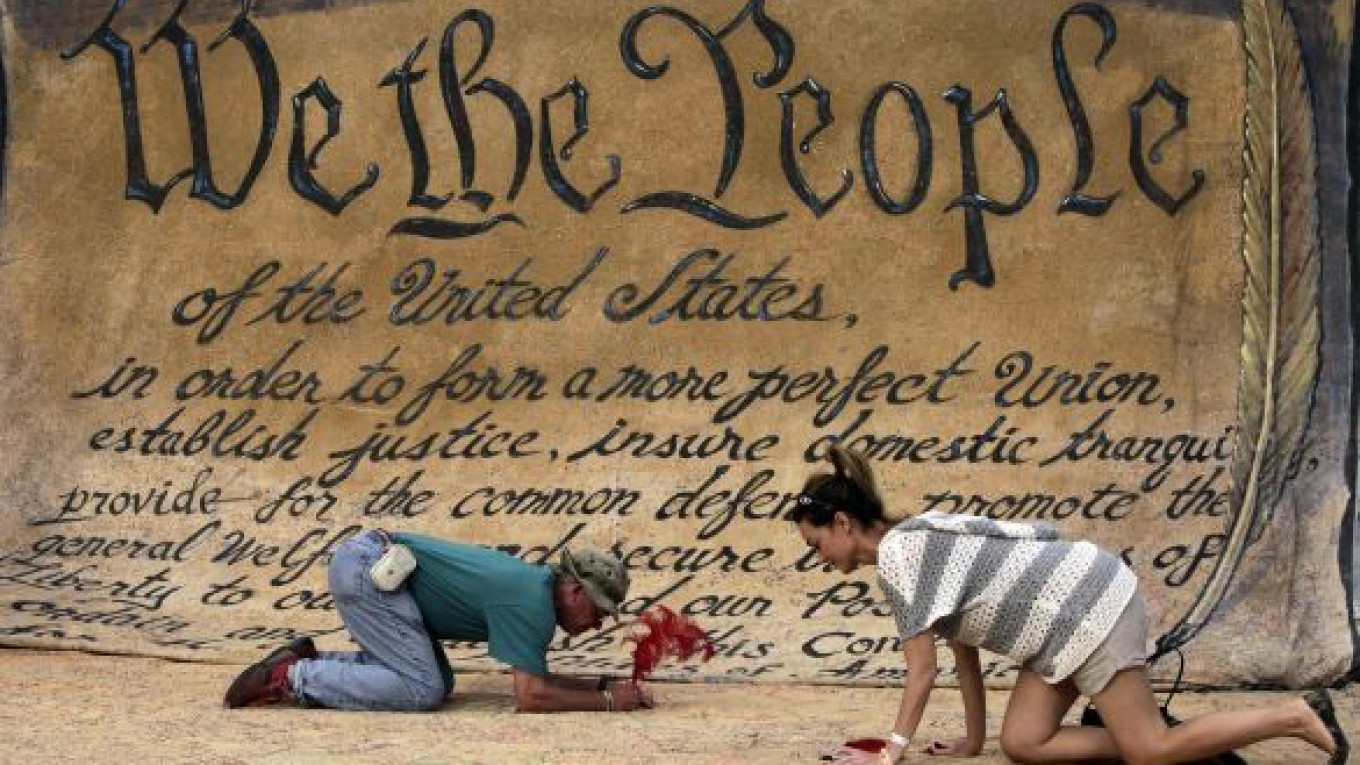The Occupy Wall Street protests across the United States with their focus on banking bailouts and unfairness appear to present a dilemma for Prime Minister Vladimir Putin.
The protests support one Kremlin agenda by underscoring the economic troubles of Moscow's Cold War foe, but could also send a signal encouraging street protests — not what Putin wants as he heads toward a second stint as president in a March vote.
Many countries have been intrigued by the Occupy Wall Street movement against financial inequality that started in a New York park and expanded across the United States from Tampa, Florida, to Portland, Oregon, and from Los Angeles to Chicago.
Hundreds of activists gathered a month ago in the Manhattan park two blocks from Wall Street to vent their anger at what they see as the excesses of New York financiers, whom they blame for the economic crisis that has struck countless ordinary Americans and reverberated across the global economy.
In the U.S. movement, Arab nations see echoes of this year's Arab Spring uprisings. Spaniards and Italians see parallels with Indignados (Indignants) activists, while voices in Tehran and Beijing with their own anti-American agendas have even said this could portend the meltdown of the United States.
This July, Putin said the United States was "acting like hooligans" in the global economy. In August, he said the United States was living beyond its means "like a parasite."
Putin and President Dmitry Medvedev have not spoken publicly about the protests, but state-run television channels that they use to shape opinion seem to have found a way around the contradiction.
Footage of crowds protesting against perceived corporate greed and government connivance echoed the emphasis on U.S. economic inequality that was a Soviet-era propaganda staple.
Such footage may also back up Putin's argument for a tight state rein on Russia's corporate world — and his colorful depictions of the United States as a flagging, sometimes dangerously irresponsible financial power.
At the same time, news footage often focusing on outspoken, outlandishly dressed participants in the U.S. protests appeared aimed at lending the crowds a circus-like look that could be to discourage Russians from trying this at home.
The Chinese, however, have not been so subtle, using the movement to fire repeated broadsides at the capitalist system.
"The Occupy Wall Street movement was sparked by the extreme disparity between the rich and the poor," the Hong Kong Economic Journal said in an editorial. "Now it looks like the spark is being turned into a great fire that is spreading."
In Cairo, Ahmed Maher, a founder and leading member of Egypt's April 6 Youth Movement, which helped topple autocrat Hosni Mubarak, said it was in contact with several groups organizing the anti-Wall Street demonstrations.
"A few days ago we saw a banner in New York that said 'This is Tahrir Square,'" Maher said, referring to the Cairo square that became the epicenter of Egypt's revolution. "The Arab Spring has definitely inspired the burst of protests in the United States and Europe."
While Spain's Indignados have poured much of their anger so far on politicians, a Madrid march of solidarity with the U.S. protesters organized for next Saturday is likely to focus more on bankers.
In London, which was hit by rioting and looting by disaffected people in early August, protesters were using social media like Facebook and Twitter to plan a protest of their own outside the London Stock Exchange on Saturday.
A Message from The Moscow Times:
Dear readers,
We are facing unprecedented challenges. Russia's Prosecutor General's Office has designated The Moscow Times as an "undesirable" organization, criminalizing our work and putting our staff at risk of prosecution. This follows our earlier unjust labeling as a "foreign agent."
These actions are direct attempts to silence independent journalism in Russia. The authorities claim our work "discredits the decisions of the Russian leadership." We see things differently: we strive to provide accurate, unbiased reporting on Russia.
We, the journalists of The Moscow Times, refuse to be silenced. But to continue our work, we need your help.
Your support, no matter how small, makes a world of difference. If you can, please support us monthly starting from just $2. It's quick to set up, and every contribution makes a significant impact.
By supporting The Moscow Times, you're defending open, independent journalism in the face of repression. Thank you for standing with us.
Remind me later.


